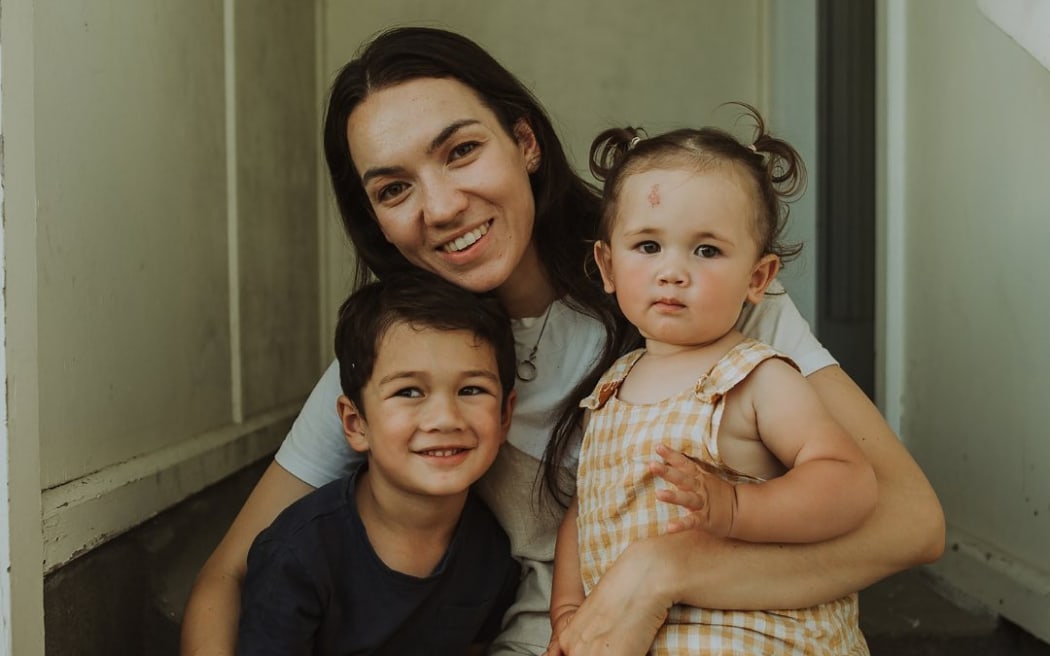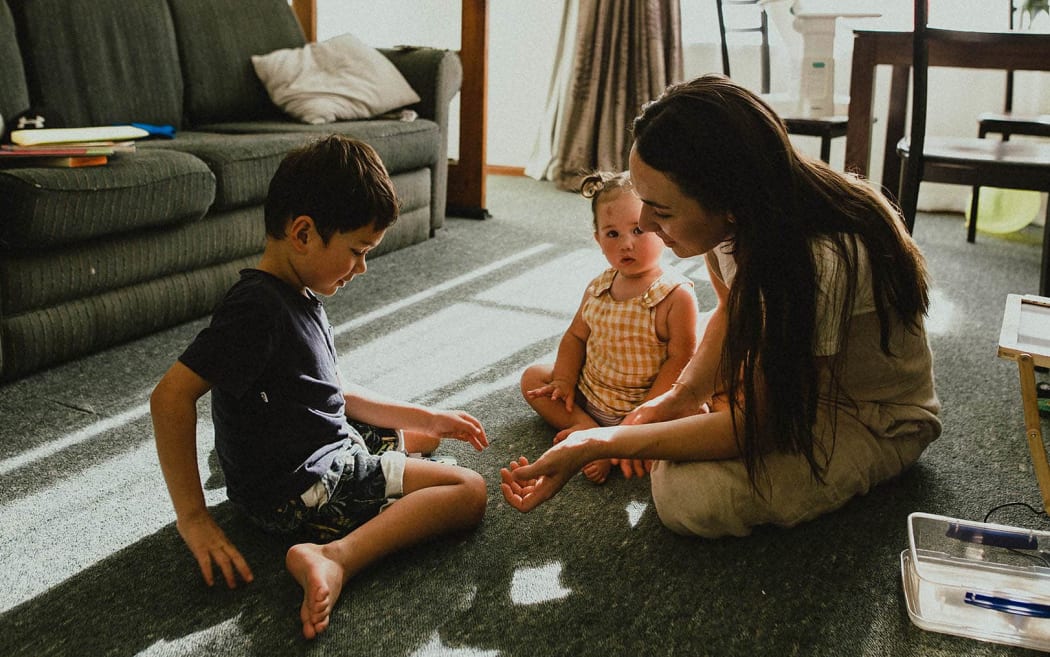Renee White thought she was a "really laid back, chill person" until her son Eli started having tantrums at around 18 months.
One night, feeling overwhelmed, some angry words flew out of Renee's mouth that she realised she'd heard in her own childhood.
The guilt that followed, and a desire to better understand emotional intelligence set Renee on a journey towards what she calls peaceful parenting.
Her business Little People, Big Emotions now sells resources that help thousands of kids and parents around the world calm themselves and each other.

Parent coach Renee White with her two children Photo: @_littlepeoplebigemotions
White, who lives in the Canterbury town of Geraldine, says that her own parents were "very loving".
"They did the best they could I know with the resources and support that they had, but they were breaking their own cycles.
When she became a parent, she tried her best not to carry on the "yelling" but after her reaction to Eli's meltdown realised she needed to dig a bit deeper to do that.
"I said some words that I didn't even know that I had remembered, but they just flew out of my mouth. I just said 'You're so annoying. Can you just leave me alone?' I really stopped in my tracks and I honestly just fell to my knees and cried because I just didn't know that I'd remembered [hearing] those words.
"But I knew right then in that moment, I could see my child self receiving those same words and understanding how my child self felt in that moment and how that would have made my son feel. And I was just shocked really about this person … the side of myself that I hadn't seen when I got triggered by my child's emotions. So yeah, that was really what sparked the change in my desire to parent differently."
Jumping online, White googled 'How do I help my son develop his emotional intelligence so that I don't get upset?'
"That was kind of like the vibe I was looking for - how to develop my child's emotional intelligence, not really realising quite yet it was all about my own emotional intelligence.
"I started reading some books around raising emotionally intelligent kids. And the more I read, I realised like 'Oh, it's all about me and how I'm able to handle my emotions, and that will then affect how my child reacts and everything around that."
White says the "awesome" parenting books of American psychologist Daniel Goleman helped her realise how a lack of emotional intelligence – ie being able to identify how she was feeling and regulate her emotions – was getting in the way of peaceful parenting.
"My go-twos were like emotional eating or yelling. [I didn't know how to have] that moment where I could pause and be like 'Okay, let's, let's do something that's actually going to be constructive for myself when getting dysregulated and become more able to choose a healthy coping mechanism to bring myself back to balance."
In the midst of a power struggle with her son, White learned to put her hand on her heart and take a deep breath.
"Breathing is one of the most important things because it's the first thing that changes when we become dysregulated. So it's one of the first things that we should focus on when we get dysregulated to bring ourselves back to balance.
"I breathe three slow, deep breaths, acknowledging how I'm feeling and validating that, saying something like 'I'm feeling really frustrated right now and I feel really stretched, and that's okay'.
"Then I can find empathy for myself and then be able to find empathy for my child and connect with him and listen to what he's saying. Then because he feels connected to me, I'm able to communicate and he's actually able to receive that communication."
White's 'peaceful parenting' approach is based on attachment science, active listening skills, parenting through connection and problem-solving with children, she says.
"When we use peaceful parenting, we're able to have more of a mutual respect, there's more trust and a good team spirit in the family. There's more willing cooperation rather than demanding obedience, which brings disconnect and just more power struggles.
"That prepares our children for being able to go into the world, being emotionally strong and resilient and having the skills to kind of weather life's storms, life's ups and downs, because they'll be able to identify their emotions and choose healthy coping mechanisms instead of self-destructive ones that hurt them and others around them."

Renee White with her two children Photo: Rebecca Dwyer
When White finds herself getting upset while parenting, she calls on the three C's – Centre, Connect and Communicate.
1. Centre yourself: She puts her hand on her heart to find self-compassion and empathy for her child
2. Connect: This could be by coming down to your child's level, softly touching their arm or bringing some playful humour into the situation.
3. Communicate: Setting a limit or boundary with your child.
Peaceful parenting doesn't use punitive measures such as timeouts, but it isn't about letting your kid do whatever you want, White says.
Boundaries are family rules like 'it's not ok to hurt other people' and 'it's not ok to break property'.
Timeouts are very much the go-to for many parents, and when her son started having tantrums and meltdowns. because she didn't want to yell, it was the same for her.
"I thought the next best thing would be to use timeouts ... but still it does have harmful effects. And even though the short-term effects may work, the long-term effects are really devastating for our children.
"Instead of putting your child in a room and expecting them to learn their lesson, really they're just learning exactly the opposite – to disconnect from themselves and their feelings and not trust their feelings and the connection with you breaks down.
Now, when White's children are having a meltdown, she or her partner goes with them to the "Calming Corner" to help them come back to balance.
"That can either be through just listening to them or just telling them that you're here and acknowledging and validating. That's really what they need in that moment is just understanding and empathy so that they can come back to balance. And then you can talk about whatever just happened or set those boundaries.
"Focus on connecting with them and showing them some empathy, because [their rage] is a sign that they're just screaming out, for help. It's scary, really scary for them when they reach that stage.
"There's so many feelings that they haven't felt before and the intensity … and though they may be screaming things like 'Go away, I don't want you or anything like that, they're really just screaming out 'I don't like these feelings. I don't know how to cope with them. Please, please show me, please help me. That's what they're really asking for.'
White says that she now sees the effects of peaceful parenting on Eli, now five, and her one-year-old daughter.
"The empathy that my son has developed because of the empathy that he has been shown is just astronomical, towards the sister, towards his peers. It's been amazing. There's just more peace in the home – that's why I like to call it peaceful parenting because there's more willing cooperation, there's more humour, there's more connection. There's more mutual trust and respect."
"My daughter's only one and a half and she's able to go to our Peaceful Place or Calming Corner when she feels upset and she knows that okay ... she'll run to our little area and show me how she's feeling on our little pictures that we have ... The tantrums are less severe or less frequent because they know that I'm going to be there to connect with them.
Calming Corner posters and emotion cards are some of the resources White sells on the Little People Big Emotions website.
When she first looked for similar emotional intelligence resources, she couldn't find any that were made in New Zealand and money was also tight.
"I honestly just prayed one day and asked what should I do and I felt [making resources myself] was the right way to go. And I knew exactly who to contact to help me illustrate all the different resources that we created."
White says she's had an overwhelming response in New Zealand and worldwide, including from teachers who create Calming Corners in their classrooms.
"They find it helpful to diffuse all of the types of situations that you can have when there's so many kids that young in one space."

